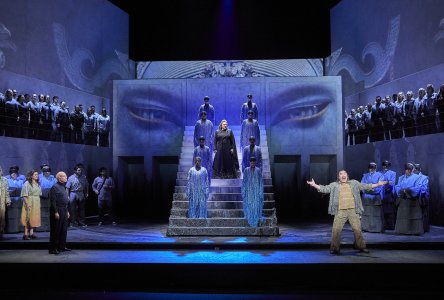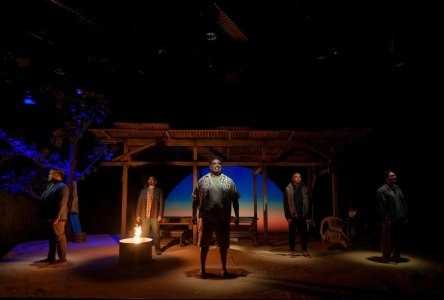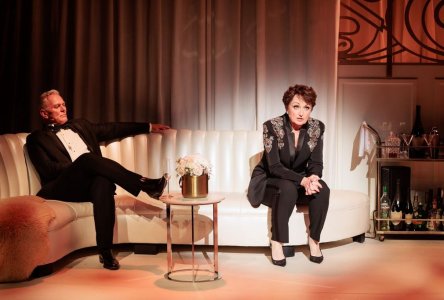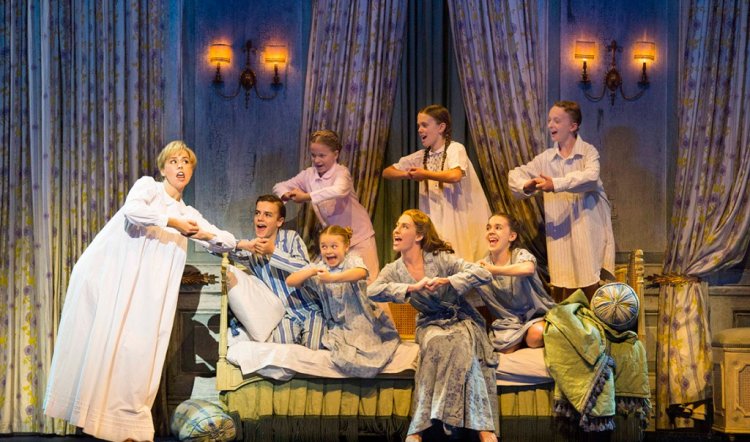
THE SOUND OF MUSIC
THE SOUND OF MUSIC, John Frost, Andrew Lloyd Webber, David Ian and the Really Useful Group at the Capitol Theatre Sydney from 17 December 2015; Lyric Theatre Brisbane from 11 March, Regent Theatre Melbourne from 13 May, Adelaide Festival Theatre from 9 August 2016. Photography by James Morgan; above Amy Lehpamer and the children; right: Jacqui Dark.
This production opened at the London Palladium in 2006 and played 954 performances (a record for that theatre) before being refashioned into an international show with local casts. And it’s easy to see why it was such a big hit as it seamlessly incorporates popular memory of the much-loved 1965 movie with the original Rodgers & Hammerstein stage masterpiece.
And in Australia The Sound of Music demonstrates the depth and breadth of talent available here in a cast that could step onto a stage anywhere in the world and own it. Front and centre, Amy Lehpamer is Maria Rainer, the restless free spirit who clearly will never be contained within the convent walls where she is a postulant and nuisance to all.
The key to Maria’s character is contained in the song sung by the three exasperated nuns (Dominica Matthews, Johanna Allen and Eleanor Blythman) in trying to explain her shortcomings to their boss, the Mother Abbess – “When I'm with her I'm confused, out of focus and bemused/ And I never know exactly where I am/ Unpredictable as weather, she's as flighty as a feather/ She's a darling! She's a demon! She's a lamb!”
And, as a friend pointed out during the interval of the joyous opening night, the song – in its opening lines of “She climbs a tree and scrapes her knee/ her dress has got a tear…” – tells us very clearly that Maria isn’t the pure soprano, butter-wouldn’t-melt Julie Andrews, but a scrape-kneed, boisterous, lovable tomboy. And that’s what Amy Lehpamer achieves: a new and deliciously believable Maria.
No wonder the kids fall for Amy like – um, seven pins – with Captain von Trapp tumbling soon after.
The other key to success is the casting of the Mother Abbess. Unlike the movie where she is a one-song sideshow, in the stage version the older woman is the moral and intellectual centre of the show. And, as another friend said, we are accustomed to the character being played and sung by a much older woman who is usually over the hill as a singer. Instead, our Australian Mother Abbess is Jacqui Dark – an operatic mezzo soprano whose acting chops have been honed in cabaret and grand opera and whose voice is at the height of its powers.
After a first half stuffed with hit songs whose lyrics are known to all: The Sound of Music, My Favourite Things, Do-Re-Mi, Sixteen Going on Seventeen, The Lonely Goatherd, So Long, Farewell, it’s the tough job of the Mother Abbess to send the audience off for the interval and Maria out of the abbey to her destiny with Climb Ev’ry Mountain. And it’s an anthem made cheesy by two generations of wobbly old sopranos and club singers, but in the hands of Jacqui Dark it soared and inspired and led her nuns’ chorus to uncommon heights.
If anyone could convert you to Catholicism and a life of contemplation it would be the sublimely badass Reverend Mother, Ms Dark.
The rest of the company is similarly terrific with the von Trapp children charmingly and convincingly played (on opening night) by Jude Padden-Row as Friedrich, Savannah Clarke as Louise, Louis Fotaine as Kurt, Madison Russo as Brigitta, Erica Giles as Marta and Nakita Clarke as Gretl, with big sister Liesl – Stefanie Jones – deftly straddling the divide between adolescence and womanhood; and well matched vocally and romantically with her first love, post-boy Rolf (Du Toit Bredenkamp).
The sharp book (Howard Lindsay and Russel Crouse) is relished by David James as the wily impresario Max Detweiler and Marina Pryor as a movingly three-dimensional Frau Schraeder, the Viennese socialite with ambitions to become the second Baroness von Trapp. Unlike the late Eleanor Parker’s icy turn in the movie, this would-be “new mother” seems simply inept rather than mean and when the Captain’s interest turns to Maria there is a credible moment of sympathy for the vanquished countess.
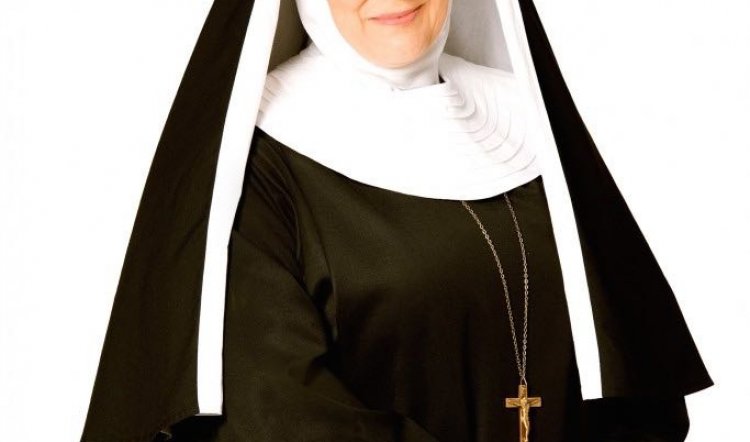
Yet although The Sound of Music is one of the great feel-good shows from the golden era of feel-good musicals, there is also depth and darkness. It begins with the Captain’s attitude towards his children – whistled orders, no singing, no fun, marching in place of play – and continues with the the Nazi take-over of Austria (a properly chilling moment when jackboots crash and the audience is confronted by watchful storm troopers).
As the widowed naval hero, Cameron Daddo has enormous sea boots to fill as no matter what, the thin-lipped image of Christopher Plummer looms large. Daddo pretty much pulls it off, however, he is tall and much better looking but as wooden as his predecessor. And he sings with similar creakiness – not quite Rex Harrison and not exactly out of tune, but charming enough. He’s a good foil for the exuberance of Lehpamer’s Maria and there is a genuine lump-in-the-throat quality to his reconciliation with the kids. Gulp.
Original director Jeremy Sams, redirected here by Gavin Mitford, should probably be credited with the palpable human qualities of the show.
Then there’s the set. Oh dear me. Why take the trouble to assemble a stellar company then short change on the look of the show? It’s obvious from the beginning (a very good place to start) when we see the glorious cavern of the Capitol stage compromised by a series of concertina-ed flats and a picture frame insert. It actually makes a stage more suited to the Woop Woop Arts Institute Chrissy panto.
As Amy Lehpamer’s voice thrillingly ascends the mountains in the opening moments, she is forced to leap two halting steps and virtually disappear into the wings rather than show us how the hills are alive. Indeed, you can actually see the join in the foothills where they appear to have been sawn in half and stuck together after a chunk has been removed. The rest of the setting – the lakeside schloss and the abbey – are similarly cramped.
And therein lies a serious rub: as Amy and others occasionally venture to either side of the stage they disappear from view for the hapless souls in the front-side stalls. And their tickets – from $75 to $175 – carry no mention of restricted sight lines. So be warned.
Nevertheless, provided you’re somewhere in the centre blocks you’d be a churl not to be transported by this company and the show to which they give their hearts and voices. And during the interval, go take a peek into the orchestra pit: bet you’ve never seen so many electronic keyboards and digital doo-dads. Amazing. And Jacqui Dark goes right over the top of the lot of them!
So, don’t be deterred by cynics and the coolth: The Sound of Music is old, gold and heavenly entertainment. Loved it.

